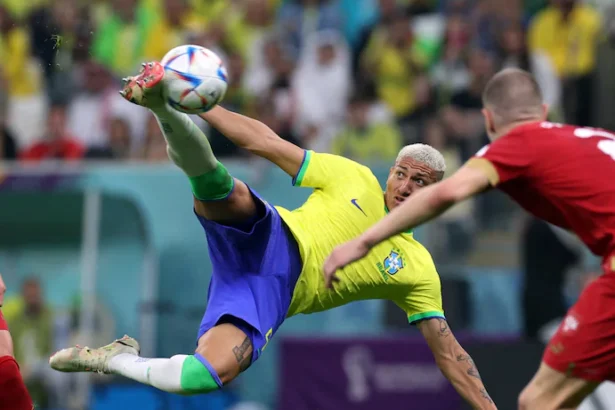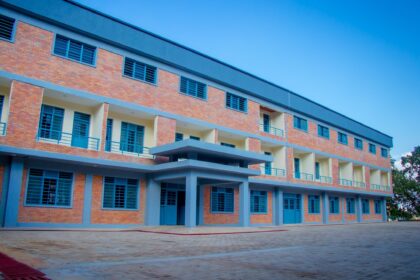LUSAIL, Qatar — Just when you might sit there and start to wonder if the idea of Brazil exceeds the reality, if the anticipation of beautiful soccer often seems to fade to the sight of a grind, the Brazilians might remind you they’re always capable of something that’ll make your eyes just about pop out of your head.
That’s what happened Thursday night, when the goal of this nascent World Cup graced Lusail Stadium two days after the upset of the ages did likewise. Where on Tuesday there had been Saudi Arabia over Argentina, now there came the spectacle on 73 minutes in Brazil over Serbia. It cemented Brazil’s 2-0 opening win. It came from Richarlison, the 25-year-old who has been doing a lot of scoring lately. It made people gasp and maybe even holler involuntarily.
It wreaked a stadium noise that carried the unmistakable sound of wonder and sustained itself longer than most such noises do. It sent Tite, the longtime Brazil manager, into a lovable frenzy as he went up to group-hug his staff, saying later, “Sometimes feelings can’t be explained.” And it lent the postgame concourses the kind of lingering buzz one cannot attain from the nonalcoholic beer they serve in these stadiums here.
“I think it was a beautiful goal,” Richarlison said of his bicycle whirl from amid the box. He mentioned previous and similar goals with the Fluminense club in Brazil and Everton in England and said: “Today I had the opportunity to make an acrobatic goal that was very, very nice, I think one of the nicest in my career. It was a very tough match for us, so I think it was one of the best goals I ever scored.”
- Advertisement -
He has scored 88 in club play, 19 in international play and two of those 19 on Thursday night, so it’s a mass of goals to assess. “As our professor, Tite, says, ‘You are smelling goal,’ ” Richarlison said. “And that’s what happens.” It brought reward to those who had traveled to the stadium in anticipation of beauty while filling the spotless new metro cars and shiny new metro stations with that old, reliable, electric yellow.
What they saw and surely assessed on the way home in Portuguese and a heap of other languages even managed to overshadow something hard to overshadow. Neymar, Brazil’s most recognizable figure, nowadays 30 and Paris-based, took a bummer of an ankle injury in the second half, played 11 more minutes before his manager realized it, earned his manager’s praise for his pain tolerance and became the subject of a news conference appearance by a team doctor, who said it’s too early to tell much.
“We are confident that Neymar will continue playing,” Tite said. “He will continue playing in the World Cup.” If so, he could help steer Brazil’s bid for a first World Cup title in a yawning 20 years, as well as pursue the record for Brazil goals held by Pele at 77, with Neymar at 75. If not, well, other stars do exist with electric skill in electric yellow, and both goals Thursday did go on merry treks through Vinicius Junior to Richarlison.
One of them was easy.
That one happened at 62 minutes, when Vinicius Junior, the 22-year-old marvel of energy and precision and Real Madrid employment, corralled a ball of which Neymar had lost track on the left edge of the box and banged it suddenly to the goal, where keeper Vanja Milinkovic-Savic sprawled to save it before Richarlison poked it in easily.
That made it 1-0, and that wasn’t what people will carry in the memory banks.
The unforgettable one came 11 minutes later, and it hinged upon Vinicius Junior’s creation yet again. He operated from the left wing, of course, and this time he slid a seeing-eye ball through a tight corridor of human obstacles. It found its way through to Richarlison amid the box, and then came the whoa.
Richarlison fielded it with his left foot and ticked it airborne. Then he whirled around, twirled his body and bicycled it right-footed. It seared maybe not even an inch over the left shoulder of Serbian defender Milos Velijkovic, as Richarlison’s flying, flailing boot nearly nudged Velijkovic’s head. It kept its screaming line and hurried in just inside the left post, with Milinkovic-Savic as helpless in his late lurch as would have been any of the 8 billion earthlings. For the second time in a brief spell, the entire Brazilian team massed in the corner for a heaving celebration.
“It goes up,” Tite said of the ball, “and he reschedules all his plan,” and what adept plan-reschedulers they are.
The starriest of the World Cup star teams, Brazil, finally had debuted at this 22nd men’s World Cup, the 22nd for which Brazil has qualified. It had become the last of the bigwigs to start in this World Cup of the odd positioning on the calendar. Its fans from around the world, abundant times abundant, had arrived with their singsong loudness in the usual outpouring of can’t-wait. With a few Serbians in red and blue mixed in, they had emptied out toward Lusail Stadium, the futuristic structure that by night kind of resembles a lit-up soap dish.
They saw Brazil, the tournament favorite sort of by default, slog around some with a more-than-capable Serbia through a first half without many wows. “During the break,” said Tite, the 61-year-old who has managed Brazil since 2016, “I needed to tell my players to calm down, because first we need to have a [lightness] that we needed to pass the ball.”
He said, “We needed to lower the adrenaline.”
They made tweaks in positioning, and soon, said assistant Cleber Xavier, “We continued to expand the speed, expand the movements and create opportunity,” whereupon they created wonder.
Group G had left the starting gate with the Brazilians tied with the Swiss at three points, and Richarlison declared “a wonderful night” with “a beautiful victory” so that “now we have another six games to reach our goal,” but first he would check on Neymar back at the hotel. Serbia, which had won its group in qualifying, “was always a lot of pressure” in the match, Tite said, “so it did require a lot from us.” All of it made a primo start toward Brazil’s bid to hike its record total of five World Cup titles to six, and reminded in one gasping swoop that the reality of Brazil at times does measure up to the idea.









